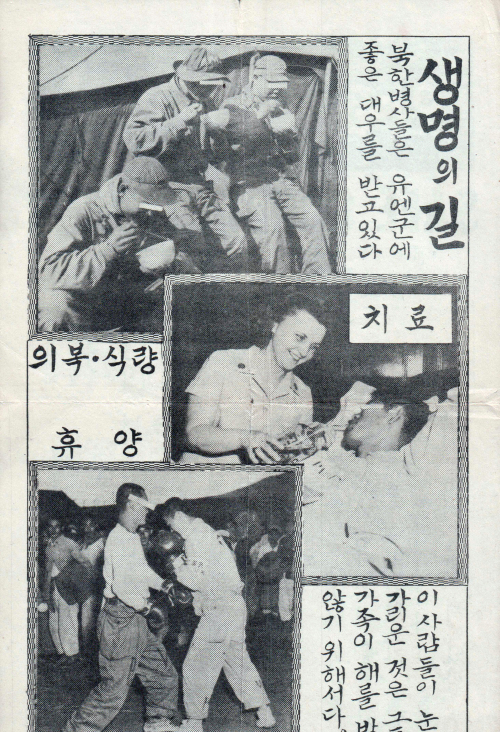NEW YORK (Yonhap News) ― A group of South Korean and U.S. academics is working to revisit the Korean War six decades later in a tech-savvy way: by digitizing photos, maps, official documents and video footage of interviews with war veterans.
The move comes as the two Koreas this week mark the 61st anniversary of the start of the 1950-53 war, in which a total of 21 nations dispatched troops to help the South fight against the invading North, supported by its communist ally, China.
 |
One of the leaflets scattered by South Korea and U.N. forces during the Korean War to encourage North Korean soldiers to defect to the South with promises of good treatment. The photo is provided by a group of academics led by Prof. Han Jong-woo of Syracuse University. (Yonhap News) |
A formal Web site will be launched around October that will include a search menu and social networking service, according to the seven-member team, led by Han Jong-woo, adjunct assistant professor of political science at the Maxwell School at Syracuse University.
“There are Internet sites related to the Korean War but there is no site yet to systemically collect wide-ranging materials and enable searches as well,” Han said. “Once the digital archives are established, you will be able to study the Korean War in detail, shown from the angle of war veterans.”
Han’s team has already acquired more than 14,000 items from 34 former U.S. soldiers who took part in the 1950-53 conflict. The materials include pictures taken by the veterans during the war, as well as letters, diaries, maps, posters and draft and retirement documents.
Efforts to digitize the collection and interview the veterans are under way, he said. The videotaped interviews provide vivid accounts of the veterans’ experiences during the war and lessons for the next generation.
Han said his team also plans to step up efforts to collect data from Korean War veterans from other nations, including North Korea and China.
The nations that fought for the South were the U.S., Britain, Turkey, Canada, Australia, France, the Netherlands, New Zealand, South Africa, Colombia, Greece, Thailand, Ethiopia, the Philippines, Belgium and Luxembourg. The other five ― Norway, Denmark, India, Italy and Sweden ― dispatched medical aid units.








